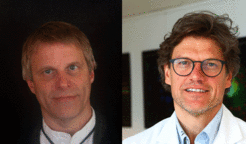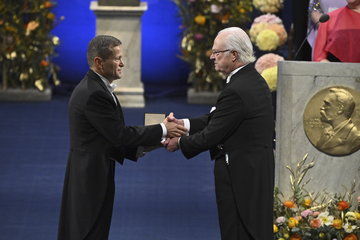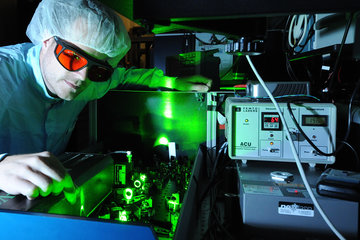A conscious decision for neuroscientists
Steven Laureys and Giulio Tononi will be honoured for their research on sleep, coma and consciousness
The Roman philosopher Seneca wrote: “That the body is lying down is no reason for supposing that the mind is at peace.” Nearly 2000 years later, researchers are trying to determine what does go on in the brain of someone who is sleeping or in a coma. The Gertrud Reemtsma Foundation has now awarded this year’s K. J. Zülch Prize to two neuroscientists whose research on the base of consciousness has delivered valuable insights into sleep and impaired consciousness. Giulio Tononi of the University of Wisconsin has developed fundamental theories on the function of sleep and the emergence of consciousness in the brain, which can be applied to improve diagnosis and treatment. Steven Laureys is head of the GIGA Consciousness Research Centre and Coma Science Group at the University and University Hospital of Liège and studies the neuronal basis of consciousness disorders and how they can be rectified following brain injuries. The award ceremony will be held in Cologne on September 8, 2017.

Humans spend one third of their lives asleep. Even mild sleep deprivation significantly affects our perception, mood, health, and quality of life. The brain drives sleep to a far greater extent than the body – it alters its function and forces the body to adopt a state of motionlessness and isolation from its environment. During sleep, our consciousness also changes. When we dream, we are conscious, but that consciousness is isolated from our environment and its effects. Non-dreaming sleep, by contrast, is a state of unconsciousness. However, why people and animals have to spend several hours a day in this dangerously vulnerable state remains unclear. Research into sleep and the bases of consciousness could improve the diagnosis and treatment of mental illness and severe brain damage.
From sleep to consciousness
Using data collected over many years, Giulio Tononi and his team have developed a hypothesis on the function of sleep, known as the synaptic homeostasis hypothesis. This posits that the core function of sleep is to restore synaptic connections between neurons to their normal state. When we sleep, the synapses which have formed or been potentiated while we were awake and processing information are able to downscale. Without sleep to renormalize synaptic transmission, there would be ever greater synaptic potentiation and an ever-increasing proliferation of new synapses. The brain would quickly run up against its limits and would be unable to absorb and process new information.
Tononi has also made use of changes in brain activity during sleep to gain insights into consciousness. He has developed a theory on the emergence of consciousness known as integrated information theory. Most other theories attempt to explain how the human brain can develop consciousness, but Tononi’s theory turns the question on its head. It identifies the key qualities of consciousness and then asks which brain mechanisms could produce these qualities. In addition to its neurophilosophical significance, Tononi’s theory is also being applied in illnesses which involve altered states of consciousness.
Neuronal basis in the brain
The focus of Steven Laureys’ research is the neuronal basis of consciousness and changes caused by damage to the brain. Day by day, doctors face the difficult task of assessing the state of consciousness of coma survivors who are unable to communicate. Accurate diagnosis of this state is crucial for the prognosis of these patients and for determining the appropriate treatment. Until recently, the diagnostic procedures used were very imprecise. By using a combination of imaging and electrophysiology techniques, such as PET, functional MRI scanning and electroencephalography (EEG) based “brain computer interfaces”, Laureys and his team have transformed the clinical care for patients in coma, “vegetative state”, minimally conscious and locked-in syndromes.
Particularly important were their findings on a 22-year old man who was erroneously diagnosed as being in a “vegetative state”. Their investigations showed that, when asked to imagine playing tennis, the patient showed similar patterns of brain activity to healthy subjects. This could be used to establish a motor-independent communication. A study of 54 patients with chronic disorders of consciousness showed that ten percent had some conscious control over their brain activity despite being unable to communicate at the bedside.
These methodologically highly complex studies laid the foundations for modern methods of diagnosing disorders of consciousness. This has meant better adaptation of therapeutic strategies including transcranial direct current stimulation, and has also improved clinical care and, more importantly, quality of life for patients with disorders of consciousness.
The Prize winners
Giulio Tononi took his medical degree, specializing in psychiatry, and a doctorate in neuroscience at the University of Pisa. From 1990–2000, he was a member of The Neurosciences Institute, first in New York and then in San Diego. He is currently Professor of Psychiatry and Consciousness Science and the Director of the Wisconsin Institute for Sleep and Consciousness, and also holds the David P. White Chair in Sleep Medicine at the University of Wisconsin–Madison.
Steven Laureys took his medical degree at the Vrije Universiteit Brussel, where he subsequently specialised in neurology. At the same time he started to pursue a career in research and obtained his MSc in Pharmaceutical Medicine in 1997. He moved to the University of Liège, where he obtained his doctorate in 2000. Steven Laureys is Research Director at the Belgian National Fund of Scientific Research and leads the GIGA Consciousness Research Centre and Coma Science Group at the University and University Hospital of Liège.
The Klaus Joachim Zülch Prize
The 2017 K. J. Zülch Prize will be awarded at a ceremony to be held in the Hansasaal in the historic Rathaus in Cologne at 10 am on September 8, 2017. Following a presentation speech by Hans-Jochen Heinze from Magdeburg University, Giulio Tononi will report on the exploration into consciousness. Mathias Bähr from Göttingen University will read the presentation speech for Steven Laureys. The Prize winner will then talk about diagnosis and treatment of consciousness disorders.
MN/HR












